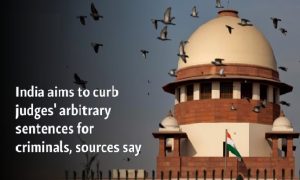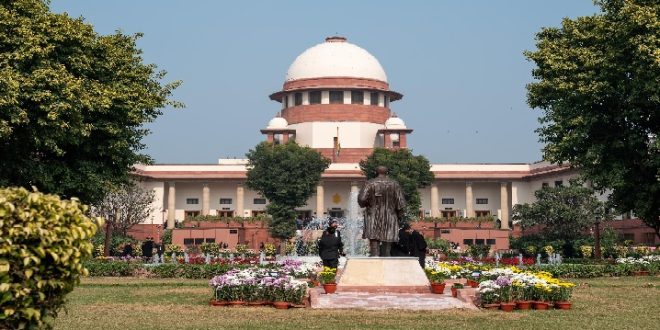07-11-2024
Bureau Report + Agencies
NEW DELHI: India plans to overhaul its criminal sentencing norms to counter accusations of arbitrary punishment, sources said, following public outrage over the 2022 rape conviction of a man within 30 minutes of trial, by a judge who handed him the death penalty.
A higher court in the eastern state of Bihar later overturned the conviction and ordered a retrial, saying the man had been denied the opportunity to defend himself and the judge had acted in “utmost haste”.
 It also called for more training for the judge.
It also called for more training for the judge.
In response, the government plans to develop a grading system to ensure punishment matches the crime, and help standardize sentencing, so pulling the judicial system closer in line with the likes of Britain, Canada and New Zealand.
The law and justice ministry will unveil its plan to the Supreme Court around December, after the court asked the government in May to consider adopting a comprehensive sentencing policy following the Bihar case, one source said.
The government sources sought anonymity as they were not authorized to talk to the media.
The ministry did not respond to a request for comment.
The source said while the plan had not been finalized, one suggestion was for a minimum punishment that will make it easier for judges, especially those in lower courts, to dole out sentences proportionate to the crime.
The policy would cover all criminal cases but the Bihar case, dating from 2021, was tried under the Protection of Children from Sexual Offences Act, opens new tab (POCSO), which prescribes punishment ranging from three years in jail to death.
The source said lower court judges often award the harshest punishment in such cases, given the outrage around the crimes.
In 2018, another lower court judge in central India ordered death for a man accused of raping and murdering a baby girl 23 days after his arrest, amid street protests against the crime. The pace of the trial and questions about the legal defence given to the accused fueled concern among some rights advocates.
 India’s judicial system is straining under a backlog of tens of millions of cases, including nearly 300,000 sexual offences against children, many of them in fast-track courts set up to exclusively try incidents of sexual assault.
India’s judicial system is straining under a backlog of tens of millions of cases, including nearly 300,000 sexual offences against children, many of them in fast-track courts set up to exclusively try incidents of sexual assault.
In September, media reported that the government had slashed its goal of swiftly setting up thousands of such fast-track courts to try sex crimes.
The change came after states such as West Bengal, where the recent brutal rape and homicide of a doctor shook the nation, fell far short of their targets regarding such courts.
In September, the media has reported about the Indian government has slashed its goal to create thousands of new tribunals to try sex crimes speedily after states like West Bengal, where the recent brutal rape-homicide of a doctor shook the nation, fell far short of targets, according to three federal government officials and an internal document seen by media.
Prime Minister Narendra Modi’s government moved to establish fast-track special courts (FTSC) in 2019 to try exclusively sex crimes, after the Supreme Court that year criticized state governments for being slow to deliver justice to victims. The court singled out Bengal and Uttar Pradesh for taking too long to reach judgment on cases involving child victims. Most sex crimes are tried by India’s heavily burdened state courts but Modi’s government planned to incentivize state governments to establish 1,023 FTSCs by March 2021 by funding 60% of costs. Each FTSC is staffed by one judicial officer and seven support staff.
 Pressmediaofindia
Pressmediaofindia




